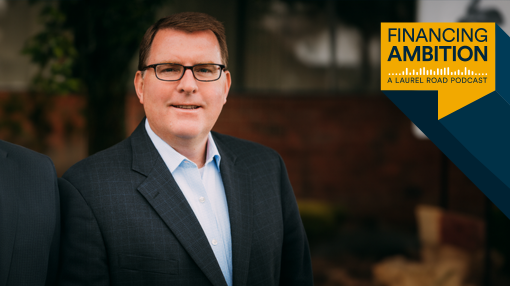Season 3 Finale: Top Money Questions Answered by Our Experts
As we wrap Season 3 of Financing AmbitionSM, hear from Laurel Road team members as they respond to your five top financial questions from 2024.

Hosts:
Eric Sutton, Laurel Road Head of Design & Content
Guests:
Shan Agish, Diana Welch Howell, Cassandra Hume, Sarah McClutchy, and Dr. Chirag Shah
Season 3, Episode 8
In our Season 3 finale episode of Financing AmbitionSM, financial experts from the Laurel Road team respond to questions submitted by our listeners. Hear from Diana Welch Howell, Shan Agish, Cassandra Hume, Sarah McClutchy, and Dr. Chirag Shah as they provide answers to five audience questions from 2024.
Transcript
Eric Sutton [00:00:07] Hi, everyone. This is Eric, and you’re listening to Financing Ambition, a Laurel Road podcast.
So, here we are recording our final episode of season three and right smack in the middle of cold and flu season, as you might be able to hear in my voice. But what a season it’s been! Looking back on everything we’ve done this season just brings joy to my heart. We’ve explored so many important financial conversations from inspiring student loan forgiveness, journeys to trends and financial benefits offered by health care employers, and even how to stay vigilant and detect financial scams and so much more. But all good things must come to an end.
So, to wrap up Season 3, today’s episode will address the top financial questions that you, our listeners, have submitted to us throughout the year. To respond to each of your questions. We’ll hear from one of our Laurel Road team members with expertise on the topic at hand.
So, without further ado, let’s dive in. Our first question is a relatable one. We’ve all felt the effects of inflation recently, whether it’s at the grocery store, the gas pump or other costs of living. And for many, that has meant relying more on credit cards. The question here is: “I’ve had to use credit cards more than I would have liked to in the past year. And it’s been tough paying down the debt. I heard that using a personal loan to consolidate credit card debt could save me money. How do I know if this is a good strategy for me?”
To answer this one, let’s hear from our product marketing manager, Shan Agish. Shan has been with Laurel Road for over two years and works closely with our product team to understand the ins and outs of our financial product suite. He also has firsthand experience with credit card balance transfers, debt consolidation, and other debt management strategies. So, let’s hear how Shan responds.
Shan Agish [00:02:17] One of the best uses for a personal loan is to consolidate and pay down high-interest credit card debt. Just remember that personal loans are still a form of debt. So, if your ultimate goal is to be debt free, it’s important to avoid taking on more credit card debt while paying off your personal loan. Using a personal loan to consolidate credit card debt can save money on interest and simplify your monthly payments. And since personal loans typically have lower interest rates than credit cards, you could even save money in interest charges over time. Additionally, options like credit card balance transfers, negotiating lower interest rates or seeking credit counseling may also be effective for managing credit card debt.
Eric Sutton [00:02:58] Okay. Good tips from Shan. Thank you for that. So, for our next question will bring in our head of Laurel Road for Hospitals pricing and strategy, Diana Welch Howell. This question comes from an early career medical professional and is about financial benefits for hospital staff.
The question is: “I’m about to start work at a hospital. What financial benefits should I be talking about with my hospital’s financial benefits administrator?” Let’s see how Diana answers this one.
Diana Welch Howell [00:03:30] Hospitals and health care systems are increasingly offering comprehensive financial wellness programs like student loan repayment and forgiveness counseling as recruitment tools to help new employees manage debt and stress. This is great news, especially for early career medical professionals, since 70% of all doctors and nurses graduate with student loan debt and 60% of the docs that we’ve surveyed feel anxious about that debt. The nurses said that, too.
You should look for and discuss such benefits as student loan repayment programs, tuition reimbursement and health savings accounts during your onboarding. At Laurel Road, we work with hospitals and health systems to offer turnkey financial solutions for all staff, including expert student loan guidance, exclusive discounts on checking savings, credit cards and lending products, and tailored financial literacy for health care professionals. For a comprehensive look at the type of financial benefits offered at hospitals and health systems, visit our content collection Student Loan Benefits for Healthcare Employees on Laurel Road Financial Resource Hub. We’ll link it in the episode notes.
Eric Sutton [00:04:38] All right. Thanks for that, Diana. Really good and helpful information. So, our next question is also from a medical professional. And it is: “How should physicians think about budgeting early in their career?”
This is a tricky one. So, let’s look to our Senior Content Manager, Cassandra Hume, for her insights here. Cassandra has been with Laurel Road since 2020 and led the launch of our interactive financial resource hub for doctors, which includes hundreds of resources that address the specific financial concerns of doctors at different stages of their careers. Let’s hear from Cassandra now.
Cassandra Hume [00:05:20] When it comes to financial education, budgeting is one of the top questions we hear from early career doctors. And it’s especially crucial for physicians, given their extensive training and long path to medical practice. Figuring out your budgeting approach will depend heavily on factors like your career, your family, and your living situation. That said, one of the most popular budgeting methods is the 50-30-20 budget, where you set aside 50% of your income for needs, 30% for wants, and 20% for savings. Early career doctors with high student loan payments may find the 20% for savings part challenging, but it’s still a good benchmark to work towards. Just keep in mind that making the required payment on your student loans should always be part of the 50% essential needs and that any additional payment you can allocate towards your loans would go into that 20% savings bucket when that’s possible.
There are, of course, other budgeting methods you can follow if you’re earlier in your career. A budgeting app that connects with your bank account can be a helpful tool for sticking to, say, a zero-sum budget. With this strategy, you allocate every dollar of income towards a specific expense so that you don’t overspend in any one area. But budgeting is not a one-size-fits-all approach, and it can take some trial and error no matter what career stage you’re in.
The most important thing is to have a budget strategy that you can maintain, and your budget can and should evolve with your career and life. For doctors, tailoring your budget for each career stage is the most important step.
Eric Sutton [00:07:00] 50, 30, 20. I like that one. Thank you for that, Cassandra. Next, we have a timely one that comes from a student loan borrower with a question about recent changes to student loan repayment and forgiveness programs. The question is: “I’m enrolled in the Saving on a Valuable Education (SAVE) plan, but there seem to be a lot of changes happening with that plan. What’s the latest and how do I keep up?”
For this one, we’ll go to our Content Manager, Sarah McClutchy. She’s developed dozens of educational resources related to student loans over the past two and a half years and has her finger right on the pulse of the ever-changing federal student loan forgiveness landscape. Let’s hear what Sarah has to say about the status of SAVE.
Sarah McClutchy [00:07:42] The SAVE plan has certainly been the subject of a lot of debate and confusion lately. As of right now, the higher courts are still reviewing legal challenges made to the SAVE plan. If you are enrolled in SAVE, you’ve been placed on a temporary interest free forbearance period until at least April 20th, 2025.
If you’re enrolled in SAVE and you’re pursuing Public Service Loan Forgiveness (PSLF), this forbearance period will not be counting towards self. You do have the option to switch into an older Income-Driven Repayment (IDR) plan if you want to continue making payments during this time. It’s definitely a fluid situation and a lot to keep up with on your own. You can find the latest news on student aid.gov, but it can also be helpful and time saving to talk to a student loan expert who can answer your questions and help you make the right decision based on your individual financial situation.
Eric Sutton [00:08:36] Yes, we talked a lot about the nuances of student loan forgiveness programs in the past two seasons, actually. We’ll see what news 2025 brings on that front.
So lastly, we have another student loan-related question, and this one is specific to doctors as well. It’s a perfect one for Laurel Road member advocate Dr. Chirag Shah to answer, given his background in both medicine and finance. So, the question is: “How can doctors think about investing when they still have high student loan debt?” Let’s hear what Dr. Shah thinks about this one.
Dr. Chirag Shah [00:09:11] While high student loan debt can be daunting. Smart investing and saving is still possible. You can save and invest at the same time you’re paying down student loan debt. First to free up some monthly cash flow. Many early career doctors can take advantage of IDR to make their monthly payments more manageable. Or you might consider refinancing when rates are favorable. And if you can qualify for a lower rate. I actually got very lucky during my second year of residency when rates were low, and I was able to refinance through Laurel Road at a much lower rate than the 7% I was paying to the federal government. From there, you can take a look at strategies for saving, take advantage of retired retirement accounts and financial planning services offered by your employer.
For easier, more immediate access to savings, you can use a high yield savings account and earn compound interest on your savings over time. This is an especially helpful account to have if you’re saving up for a down payment on a home – one of the most important investments most people make in their lifetime. Well, it can be stressful.
Remember that you don’t need to feel pressured to rush to pay off your student loans quickly, even if your student loan balance is a big number. You can save up for milestone purchases while making slow and steady progress on your student loan debt. It’s an important investment you made in your future. So, as long as you have a plan to tackle your student loans, they don’t need to stand in the way of your financial goals. Let me know if you have any questions.
Eric Sutton [00:10:32] Okay. Those are all very helpful insights. Thank you, Dr. Shah. And that brings us to the end of our Season 3 finale! I want to thank all of our Laurel Road team members and our member advocate, Dr. Shah, for joining us to answer our listeners’ questions in this episode.
And thank you to everyone who tuned in this year to listen to Financing Ambition. We saw a record number of listeners this year and received some really great feedback. And we’re so happy you’re tuning in here to learn about personal finance with us. We can’t wait to bring you even more great episodes in 2025 with Season 4 of Financing Ambition.
And for any listeners with financial questions of your own, send us your question for a chance to have it answered by our own Laurel Road experts in an upcoming episode of Season 4. Just visit laurelroad.com/listener-questions or you can send us a DM on Facebook, Instagram, or LinkedIn.
Episode Notes
Content Collection: Student Loan Benefits for Healthcare Employees
Have a financial question for our experts? Submit your question here.
Disclosures:
Only the U.S. Department of Education is able to make a final determination of whether a borrower’s payment history is compliant with federal repayment programs. See Student aid.gov for more details.
This podcast is produced for information purposes only and is not an offer or solicitation of any product. Any views, opinions, findings and conclusions expressed in this podcast are solely those of the participants and do not necessarily reflect the views of Laurel Road or its affiliates. Laurel Road KeyBank and its affiliates are not providing any financial, economic, legal, accounting or tax advice or recommendations in this podcast. The information contained in this recording may not be current, and Laurel Road has no obligation to provide any updates or changes. Neither Laurel Road nor any of its affiliates makes any representation or warranty of any kind as to the accuracy or completeness of the information in this podcast and expressly disclaims any and all liabilities around such.
Our guests may have received compensation for promoting Laurel Road unauthorized use or reproduction of this podcast as expressly prohibited. Loan approval is subject to credit approval and program guidelines, Programs, rates, terms and products vary and are subject to change at any time without notice. Student loans, mortgages, personal loans and credit cards are not FDIC insured or guaranteed. For more information and full disclosures, go to Laurel Road.com. Laurel Road is a branch of KeyBank member FDIC.
Don’t miss the latest financial resources.
This site is protected by reCAPTCHA and the Google Privacy Policy and Terms of Service apply.
Get tailored Laurel Road resources delivered to your inbox.
Search Results


